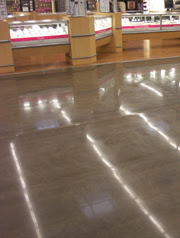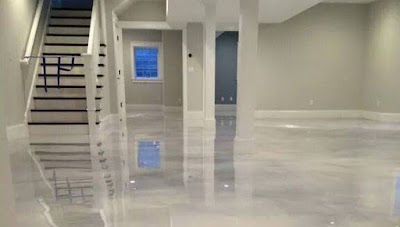Industrial epoxy coatings are widely used to resurface concrete and steel. They can transform a drab, dusty concrete floor to one with light reflection with easy maintenance. Epoxies are a liquid flooring. Liquids consist of a harder and a resin. When mixed together the chemicals cross link becoming very durable.
They cure quickly and adhere to concrete provided the concrete surface has been prepared with mechanical grinding or shot blasting. These surface prep methods remove potential bond breakers such as grease, oil, glue and paint. Shot blasting and floor grinding also increases the surface area for epoxies to bond. Imagine the difference between a surface with coarseness of fine versus rough sandpaper.
Industrial epoxy is not a simple coating like paint. Manufacturers use scientists to engineer epoxy coatings for specific uses. For example, aircraft carriers require a specific coating able to withstand the elements as well as heat from jets as they take off as well as petroleum.
Other epoxies include Novoloac systems engineered to withstand chemical s. They serve as a secondary containment system in case of a leak from chemicals or hazardous waste.
Uses of Industrial Epoxy
- Aviation – used in Hangars, Assembly areas, maintenance areas and warehouses
- Breweries – Used in tasting rooms and commercial kitchens.
- Electronic – ESD or Electrostatic dissemination. This is used in clean rooms, warehousing and chemical areas to eliminate shock and combustion of chemicals.
- Healthcare – flooring in corridors, kitchen and cafeterias, operating rooms and reception areas.
- Chemical – Chemical storage, processing areas and secondary containment.
- Retail – popular choices for shops, cafeterias, shopping malls and supermarkets.
- Food and Beverage – bakeries, dairy processing, freezer and cold storage, meat and fish processing, snack foods processing and fruit and vegetables processing.
- Pharmaceutical – Clean rooms and laboratories, production, assembly areas and solvent storage.
Reasons why industrial epoxy is chosen more often:
- Resistant to mild acids, strong alkaline and other chemicals
- Slip resistant especially during wet conditions
- Stain resistant
- Easy to clean, including walls and ceilings
- Insect proof and rodent proof
- High-traffic durability
- Can withstand heavy impact
- Limitless choice for colors and textures
- Seamless
There is a stark difference between a garage floor epoxy paint sold in home improvement stores and the professional grades installed by experienced professionals.
Most professional grade epoxy coatings cost $1.00 per square foot and quickly jumps to $2.00 PSF or more depending on the application of colored chips, quartz or sand. Each finish coat added increases cost of material and labor.
There are various finish coats such as urethanes and polyaspartics and anti slip additives that will increase the total coat of a project.
Related articles:
Industrial Epoxy
from http://ift.tt/2gJ9Fst
Learn more about Boston Concrete Floor Coatings








